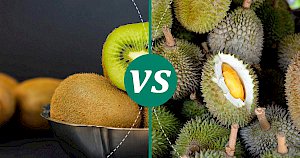Durian vs Kiwi: Nutrition & Calories Compare


Durian vs Kiwi
Nutrition Facts
Serving size:
change
5g10g15g20g30g40g50g60g80g100g120g140g160g180g200g220g250g300g350g400g450g500g600g700g800g900g1000g
1oz2oz3oz4oz5oz6oz7oz8oz10oz12oz15oz20oz25oz30oz35oz40oz50oz
Amount Per Serving:
Serving size:
change
5g10g15g20g30g40g50g60g80g100g120g140g160g180g200g220g250g300g350g400g450g500g600g700g800g900g1000g
1oz2oz3oz4oz5oz6oz7oz8oz10oz12oz15oz20oz25oz30oz35oz40oz50oz
Amount Per Serving:
Durian vs Kiwi 100g Compare
| per 100g | Durian | Kiwi |
|---|---|---|
| Calories | 147 | 61 |
| Carbohydrates | 27.09 g | 14.66 g |
| Fat | 5.33 g | 0.52 g |
| Dietary fiber | 3.8 g | 3 g |
| Protein | 1.47 g | 1 g |
| Calcium | 6 mg | 34 mg |
| Iron | 0.43 mg | 0.31 mg |
| Magnessium | 30 mg | 17 mg |
| Potassium | 436 mg | 312 mg |
| Sodium | 2 mg | 3 mg |
| Vitaminium A | 44 µg | 87 µg |
| Vitaminium B1 (Thiamine) | 0.374 mg | 0.027 mg |
| Vitaminium B2 (riboflavin) | 0.2 mg | 0.025 mg |
| Vitaminium B3 (Niacin) | 1.074 mg | 0.341 mg |
| Vitaminium B9 (Folic acid) | 36 mg | 25 mg |
| Vitaminium C | 19.7 mg | 92.7 mg |
| Beta karoten | 23 mg | 52 mg |
When it comes to exotic fruits, Durian and Kiwi are two names that often evoke strong reactions and curiosity. Known as the "king of fruits," Durian is famous for its large size, unique aroma, and rich custard-like texture. On the other hand, Kiwi, with its bright green flesh and tiny black seeds, is celebrated for its tangy flavor and numerous health benefits. But beyond their taste and sensory appeal, how do these fruits compare in terms of nutrition? Let's delve into the intriguing world of Durian vs. Kiwi.
A Glimpse into the Nutritional Profiles
At first glance, the difference in calorie content between Durian and Kiwi is quite striking. With 147 calories per serving, Durian is considerably more calorie-dense than Kiwi, which has only 61 calories. This makes Kiwi a more appealing option for those watching their calorie intake.
When it comes to macronutrients, Durian contains more carbohydrates, fats, and proteins. Specifically, it has 27.09 grams of carbohydrates, 5.33 grams of fat, and 1.47 grams of protein. In contrast, Kiwi offers 14.66 grams of carbohydrates, a mere 0.52 grams of fat, and 1 gram of protein. The higher fat content in Durian primarily comes from its natural oils, contributing to its creamy texture.
Fiber and Vitamins Galore
Both fruits are good sources of dietary fiber, with Durian providing 3.8 grams and Kiwi slightly less at 3 grams. Fiber is essential for maintaining a healthy digestive system and promoting a feeling of fullness, which can aid in weight management.
Vitamins are where Kiwi truly shines, particularly with its high Vitamin C content. One serving of Kiwi contains a whopping 92.7 mg of Vitamin C, significantly higher than Durian's 19.7 mg. Vitamin C is crucial for immune system function, skin health, and iron absorption. Kiwi also has the upper hand in Vitamin A, Vitamin E, and Vitamin K, making it an excellent choice for supporting overall health.
Minerals and More
Both fruits offer a range of essential minerals, but they excel in different areas. Durian has more potassium and magnesium, with 436 mg and 30 mg respectively, compared to Kiwi's 312 mg of potassium and 17 mg of magnesium. These minerals are vital for heart health, muscle function, and energy production.
However, Kiwi takes the lead in calcium and iron, providing 34 mg of calcium and 0.31 mg of iron, while Durian offers 6 mg of calcium and 0.43 mg of iron. Calcium is essential for bone health, and iron plays a key role in oxygen transport in the body.
Conclusion: A Fruitful Comparison
In the battle of Durian vs. Kiwi, the choice ultimately depends on personal preferences and nutritional goals. Durian, with its higher calorie and fat content, may be more suitable for those looking to increase their energy intake. Meanwhile, Kiwi is a lighter option packed with vitamins and minerals, ideal for individuals seeking to boost their nutrient consumption without adding too many calories.
Regardless of which fruit you prefer, both Durian and Kiwi offer unique flavors and a bounty of health benefits. Incorporating a variety of fruits into your diet is a great way to ensure you're getting a wide range of nutrients essential for maintaining good health. So, why not enjoy the best of both worlds?
Durian 100g
147kcalCalories source
- 67% CARBS.
- 4% PROTEIN
- 30% FAT
Kiwi 100g
61kcalCalories source
- 87% CARBS
- 6% PROTEIN
- 7% FAT
Compares of durian
- Durian vs Apple
- Durian vs Avocado
- Durian vs Banana
- Durian vs Blueberries
- Durian vs Cherries
- Durian vs Fig
- see all compares of durian
Compares of kiwi
Read also:
- Calories from Durian
- Calories of Black lilac
- Calories in Fejhoa
- Figs calories per 100g
- Goji berries protein per 100g
- How many calories does gooseberry have?
- Calories in a half of grapefruit
- Calories in whole grapefruit
- Calories for one, two or more grapefruits
- Calories in slice of grapefruit
- How much protein in guava?
Marcin Piotrowicz
calories-info.com creator
Healthy diet and healthy lifestyle promoter
Add comment